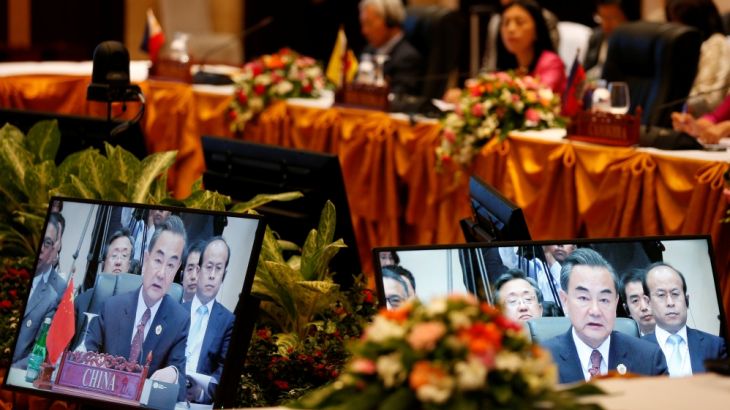ASEAN bloc breaks deadlock on South China Sea
Manila had earlier requested the bloc’s joint statement to mention recent UN-backed court ruling on South China Sea row.

Southeast Asian nations have overcome days of deadlock after the Philippines dropped a request for their joint statement to mention a landmark legal ruling on the South China Sea, officials said, after objections from Cambodia.
China publicly thanked Cambodia on Monday for supporting its stance on maritime disputes, a position which threw the regional block’s weekend meeting in the Laos capital of Vientiane into disarray.
Keep reading
list of 4 itemsJapan, Philippines, US rebuke China over ‘dangerous’ South China Sea moves
Biden, Japan leader Kishida announce stronger defence ties in state visit
China’s Xi says outside interference can’t stop reunion with Taiwan
Competing claims with China in the vital shipping lane are among the most contentious issues for the Association of Southeast Asian Nations, as the bloc’s 10 members are pulled between their desire to assert sovereignty while finding common ground and fostering ties with Beijing.
In a ruling by the United Nations-backed Permanent Court of Arbitration on July 12, the Philippines won an emphatic legal victory over China on the dispute.
READ MORE: Why China cares about the South China Sea
The Philippines and Vietnam both wanted the ruling, which denied China’s sweeping claims in the strategic seaway that channels more than $5 trillion in global trade each year, and a call to respect international maritime law to feature in the communique.
Backing China’s call for bilateral discussions, Cambodia opposed the wording on the ruling, diplomats said.
Manila agreed to drop the reference to the ruling in the communique, one ASEAN diplomat said on Monday, in an effort to prevent the disagreement leading to the group failing to issue a statement.
The communiquinstead to the need to find peaceful resolutions to disputes in the South China Sea in accordance with international law, including the UN’s law of the sea, to which the court ruling referred.
![The competing claims with China are among the most contentious issues for ASEAN [EPA]](/wp-content/uploads/2016/07/59442289270f4bf4a123dfa51ac41fee_18.jpeg)
“We remain seriously concerned about recent and ongoing developments and took note of the concerns expressed by some ministers on the land reclamations and escalation of activities in the area, which have eroded trust and confidence, increased tensions and may undermine peace, security and stability in the region,” the ASEAN communique said.
In a separate statement, China and ASEAN reaffirmed a commitment to freedom of navigation and overflight in the South China Sea and said they would refrain from activities that would complicate or escalate disputes. That included inhabiting any presently uninhabited islands or reefs, it added.
China’s Foreign Minister Wang Yi said a page had been turned after the “deeply flawed” ruling and it was time to lower the temperature in the dispute.
“It seems like certain countries from outside the region have got all worked up keeping the fever high,” Wang told reporters.
READ MORE: Taking a cruise to disputed South China Sea islands
China frequently blames the United States for raising tensions in the region and has warned regional rival Japan to steer clear of the dispute.
The United States, allied with the Philippines and cultivating closer relations with Vietnam, has called on China to respect the court’s ruling.
It has criticised China’s building of artificial islands and facilities in the sea and has sailed warships close to the disputed territory to assert freedom of navigation rights.
US Secretary of State John Kerry arrived in Laos’ capital on Monday. He is expected to discuss maritime issues in a meeting with Wang, as well as in meetings with ASEAN members.